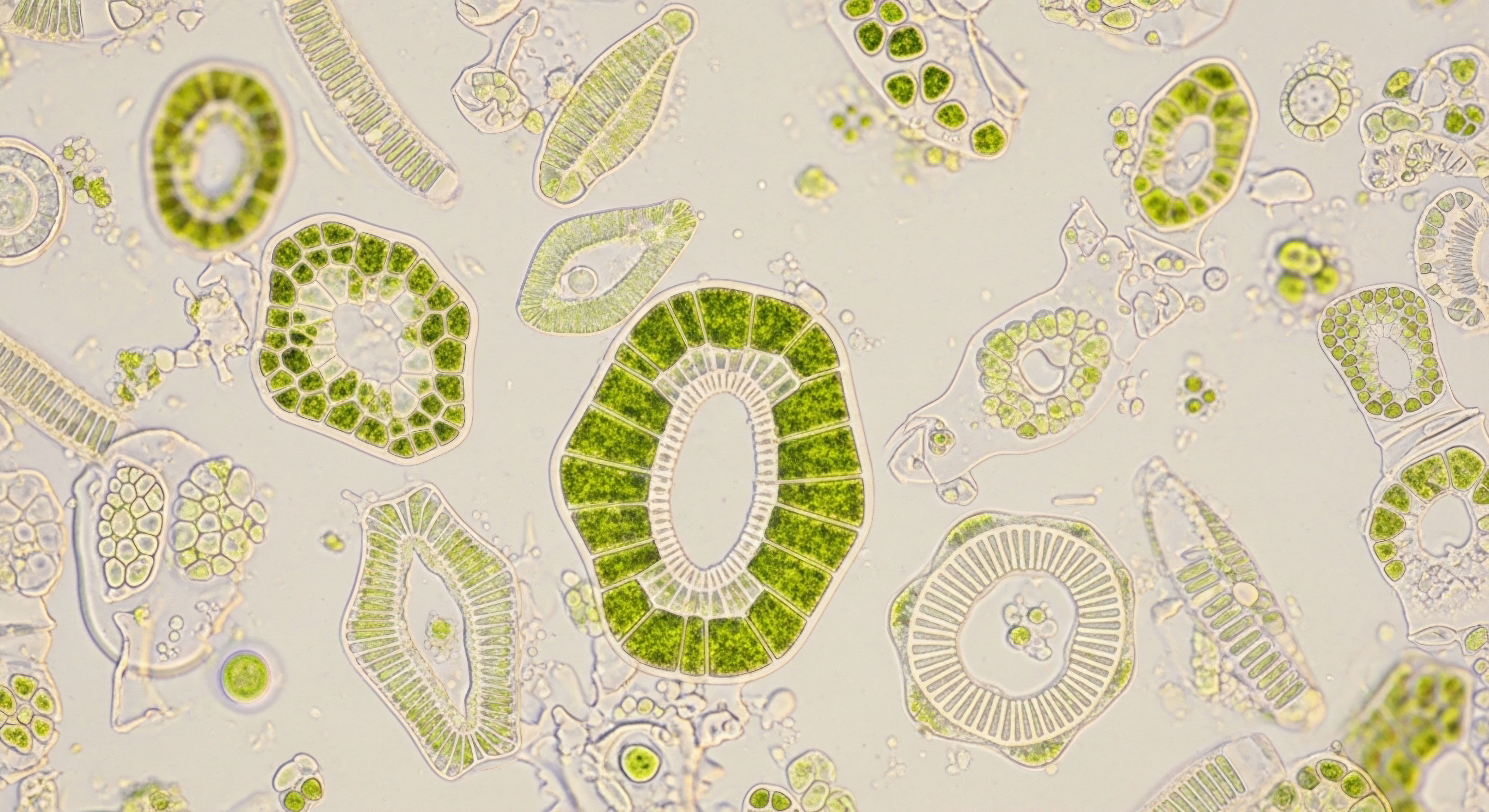

Fundamentals
Perhaps you have experienced a persistent weariness, a subtle shift in your body’s rhythm, or a feeling that your vitality has diminished, despite your best efforts. Many individuals report a sense of being out of sync, where energy levels fluctuate unpredictably, and a general malaise seems to settle in.
This experience can be disorienting, leaving one searching for explanations beyond the obvious. It is a common sentiment, a quiet struggle against an unseen force that seems to govern one’s daily function. Understanding the intricate systems within your body provides a pathway to reclaiming that lost vigor.
Our bodies possess an extraordinary network of internal communication, a complex interplay of chemical messengers that orchestrate nearly every physiological process. Among these, the endocrine system stands as a master conductor, with the thyroid gland playing a particularly significant role.
The thyroid, a small, butterfly-shaped gland situated at the base of your neck, produces hormones that regulate metabolism, energy production, and even mood. When this delicate balance is disrupted, the effects can ripple throughout your entire being, manifesting as the very symptoms you might be experiencing.
Thyroid hormones, primarily thyroxine (T4) and triiodothyronine (T3), are central to this metabolic regulation. T4 represents the main hormone produced by the thyroid gland, circulating in higher concentrations. T3, conversely, is the biologically active form, responsible for directly influencing cellular activity. The body’s ability to convert T4 into T3 is a critical step in ensuring adequate hormonal signaling. This conversion largely occurs outside the thyroid gland, in peripheral tissues, with a notable portion taking place within the gastrointestinal tract.
The body’s internal communication systems, particularly the endocrine network, govern our vitality and daily function.
The digestive system, often considered merely a conduit for nutrient absorption, is a vibrant ecosystem, home to trillions of microorganisms collectively known as the gut microbiome. This vast community of bacteria, fungi, and other microbes plays a far more expansive role than previously understood, extending its influence to distant physiological processes, including hormonal regulation. The relationship between the gut and the thyroid is a compelling illustration of this interconnectedness, often termed the gut-thyroid axis.
This axis describes a bidirectional communication pathway where the health and composition of your gut microbiome directly affect thyroid function, and conversely, thyroid hormones can influence gut integrity and microbial balance. A healthy, diverse gut microbiome supports optimal thyroid hormone metabolism through several mechanisms. Certain beneficial bacteria possess enzymes, such as sulfatases and beta-glucuronidases, which are instrumental in the deconjugation of thyroid hormones. This process releases active T3 from its inactive, conjugated forms, making it available for cellular use.
A balanced gut environment also contributes to the absorption of essential micronutrients vital for thyroid hormone synthesis and conversion. Elements like selenium, zinc, iodine, and iron are indispensable for the thyroid gland’s proper operation and the enzymatic reactions that convert T4 to T3. When the gut microbiome is imbalanced, a condition known as dysbiosis, the absorption of these critical nutrients can be compromised, potentially hindering thyroid hormone production and conversion.

How Does Gut Health Affect Thyroid Hormone Availability?
The gut’s role extends to influencing the enterohepatic circulation of thyroid hormones. Thyroid hormones, once metabolized in the liver, are conjugated and excreted into the bile, then reabsorbed in the intestines. A healthy gut microbiome facilitates this reabsorption, ensuring a continuous supply of hormones. Disruptions in the gut’s microbial composition can interfere with this cycle, potentially leading to altered thyroid hormone levels in circulation.
Moreover, the gut microbiome influences systemic inflammation and immune regulation. Many thyroid conditions, particularly autoimmune thyroid diseases like Hashimoto’s thyroiditis and Graves’ disease, involve an immune system imbalance. A compromised gut barrier, often a consequence of dysbiosis, can allow antigens to pass into the bloodstream, triggering an immune response that may cross-react with thyroid tissue. By modulating immune responses and maintaining gut barrier integrity, a healthy microbiome indirectly supports thyroid health.
The foundational understanding of these connections provides a powerful lens through which to view symptoms that might otherwise seem disparate. Recognizing the gut’s profound influence on thyroid hormone conversion offers a new avenue for intervention and support, moving beyond conventional approaches to address underlying biological mechanisms. This holistic perspective acknowledges that true well-being arises from the harmonious operation of all bodily systems.


Intermediate
Building upon the foundational understanding of the gut-thyroid axis, we now consider specific interventions aimed at optimizing this delicate relationship. Probiotic supplementation, the introduction of beneficial live microorganisms into the digestive system, represents a targeted strategy to modulate the gut microbiome. The premise behind this approach rests on the idea that by restoring microbial balance, we can enhance the body’s intrinsic capacity for thyroid hormone conversion and overall endocrine stability.
The mechanisms by which probiotics might influence thyroid hormone conversion are multifaceted. As previously noted, certain bacterial strains possess enzymes capable of deconjugating thyroid hormones, thereby increasing the availability of active T3. This enzymatic activity is a key area of interest for researchers investigating the therapeutic potential of probiotics in thyroid health. Beyond direct enzymatic action, probiotics can influence the gut environment in ways that indirectly support thyroid function.
Probiotics contribute to the production of short-chain fatty acids (SCFAs), such as butyrate, propionate, and acetate, through the fermentation of dietary fibers. These SCFAs serve as vital energy sources for colonocytes, the cells lining the colon, thereby strengthening the intestinal barrier. A robust intestinal barrier is essential for preventing the leakage of toxins and undigested food particles into the bloodstream, a phenomenon known as “leaky gut,” which can trigger systemic inflammation and autoimmune responses detrimental to thyroid tissue.
Probiotic supplementation aims to restore microbial balance, enhancing the body’s capacity for thyroid hormone conversion.
Clinical investigations into probiotic supplementation and thyroid function have yielded varying, yet promising, results. Some studies indicate that specific probiotic formulations can stabilize serum hormone levels and potentially reduce the requirement for exogenous thyroid hormone replacement in individuals with hypothyroidism. For instance, research involving a combination of Lactobacilli and Bifidobacteriaceae strains has shown a reduced need for T4 dose adjustments in patients receiving levothyroxine, suggesting improved levothyroxine availability and stabilized thyroid function.
Another study involving a synbiotic blend (probiotics with prebiotics like inulin and oat fiber) demonstrated a significant reduction in Thyroid Stimulating Hormone (TSH) levels, along with an increase in free T3 (fT3), and reported improvements in symptoms such as fatigue in hypothyroid patients. These findings collectively suggest that modulating the gut microbiome can indeed influence the dynamics of thyroid hormone metabolism and the body’s response to thyroid support.
The influence of probiotics extends beyond direct thyroid hormone conversion to broader metabolic and hormonal regulation, which is highly relevant to comprehensive wellness protocols, including hormonal optimization therapies. Optimal thyroid function is a prerequisite for the efficacy of protocols such as Testosterone Replacement Therapy (TRT) for men and women, or Growth Hormone Peptide Therapy. When thyroid function is suboptimal, the body’s metabolic machinery operates less efficiently, potentially hindering the desired outcomes of these advanced therapies.

Can Probiotics Influence Other Hormonal Systems?
The gut microbiome interacts with the body’s endocrine system through several complex mechanisms, including the gut-brain axis. Probiotics can influence the production and release of neurotransmitters and hormones, such as dopamine, serotonin, and norepinephrine. They also contribute to reducing stress hormones like cortisol. This broader hormonal influence underscores the systemic impact of gut health on overall well-being and its relevance to conditions managed by targeted hormonal interventions.
For men undergoing TRT, maintaining optimal thyroid function ensures that the body’s metabolic rate supports muscle protein synthesis and fat metabolism effectively, complementing the effects of testosterone. Similarly, for women receiving hormonal optimization protocols, a well-functioning thyroid contributes to balanced energy levels, mood stability, and reproductive health, all of which are critical for successful outcomes.
Consider the specific protocols for hormonal optimization.

Testosterone Replacement Therapy for Men
For men experiencing symptoms of low testosterone, standard protocols often involve weekly intramuscular injections of Testosterone Cypionate. This is frequently combined with Gonadorelin to maintain natural testosterone production and fertility, and Anastrozole to manage estrogen conversion. A healthy gut and optimal thyroid function ensure that the body can properly utilize these exogenous hormones, process metabolites, and maintain overall metabolic health, thereby maximizing the therapeutic benefits and minimizing potential side effects.

Testosterone Replacement Therapy for Women
Women with symptoms related to hormonal changes, such as irregular cycles, mood shifts, or low libido, may receive Testosterone Cypionate via subcutaneous injection, often alongside Progesterone based on menopausal status. The body’s metabolic efficiency, heavily influenced by thyroid hormones, directly impacts how these administered hormones are processed and utilized at the cellular level. A well-supported thyroid-gut axis can therefore enhance the responsiveness to these hormonal recalibration efforts.
The integration of gut health strategies, including probiotic supplementation, into these broader hormonal wellness protocols represents a sophisticated approach to personalized care. It acknowledges that the body operates as an interconnected system, where optimizing one fundamental aspect, such as gut-mediated thyroid hormone conversion, can create a cascade of positive effects across multiple physiological domains.
| Hormone/Marker | Observed Probiotic Effect | Mechanism/Context |
|---|---|---|
| Thyroid Stimulating Hormone (TSH) | Decreased levels | Improved thyroid feedback loop, reduced levothyroxine dose requirement |
| Free T3 (fT3) | Increased levels | Enhanced T4 to T3 conversion, deconjugation by bacterial enzymes |
| Levothyroxine Absorption | Improved availability | Modulation of gut environment, stabilization of hormone levels |
| Cortisol | Reduced stress biomarker | Gut-brain axis influence, reduced systemic stress response |
| Sex Hormones (Estrogen, Testosterone) | Indirect influence | Modulation of enterohepatic circulation, overall metabolic health |
The careful selection of probiotic strains and the consideration of individual gut microbiome composition are important for maximizing therapeutic benefits. While general probiotic supplements offer broad support, a personalized approach, perhaps guided by microbiome analysis, could further refine interventions for optimal thyroid hormone conversion and overall endocrine balance.


Academic
The scientific exploration of the gut microbiome’s influence on thyroid hormone conversion moves beyond observational correlations to a detailed examination of molecular and enzymatic mechanisms. This deep dive into endocrinology reveals the intricate dance between host physiology and microbial activity, providing a robust framework for understanding how probiotic supplementation might precisely recalibrate thyroid function. The complexity of this interaction underscores the need for a systems-biology perspective, where the interplay of various biological axes and metabolic pathways is considered.
Thyroid hormone metabolism is a tightly regulated process, involving a series of deiodination reactions that convert the prohormone T4 into its active form, T3, or inactive metabolites. The primary enzymes responsible for these conversions are the iodothyronine deiodinases (D1, D2, D3). While D1 and D2 primarily generate T3, D3 inactivates both T4 and T3. The gut microbiome introduces an additional layer of regulatory complexity through its own enzymatic repertoire.
Specific bacterial enzymes, notably beta-glucuronidases and sulfatases, play a direct role in the enterohepatic circulation of thyroid hormones. In the liver, T3 and T4 are conjugated with glucuronic acid or sulfate, rendering them water-soluble for excretion into bile. These conjugated forms are then transported to the intestine.
Here, bacterial beta-glucuronidases and sulfatases deconjugate the hormones, releasing free T3 and T4 back into the circulation for reabsorption. A robust population of these specific bacterial strains within the gut can therefore enhance the recycling of thyroid hormones, contributing to their overall bioavailability.
Bacterial enzymes in the gut directly influence thyroid hormone recycling, impacting their bioavailability.
Dysbiosis, an imbalance in the gut microbial community, can disrupt this delicate enzymatic equilibrium. A reduction in beneficial bacteria possessing these deconjugating enzymes, or an overgrowth of pathogenic strains that produce inflammatory metabolites, can impair the enterohepatic circulation of thyroid hormones.
This impairment may lead to a reduced pool of available active T3, even if the thyroid gland itself is producing adequate T4. The implications extend to the efficacy of exogenous thyroid hormone replacement, as the absorption and subsequent deconjugation of medications like levothyroxine can be affected by gut microbial composition.

What Role Do Micronutrients Play in Gut-Thyroid Interactions?
Beyond direct enzymatic conversion, the gut microbiome significantly influences the absorption and utilization of essential micronutrients critical for thyroid health.
- Selenium ∞ This trace element is a component of selenoproteins, including the deiodinase enzymes themselves. Adequate selenium levels are indispensable for the efficient conversion of T4 to T3. Certain gut bacteria can influence selenium bioavailability.
- Zinc ∞ Zinc is a cofactor for numerous enzymes involved in thyroid hormone synthesis and metabolism. It also plays a role in immune function and gut barrier integrity.
- Iodine ∞ The fundamental building block of thyroid hormones, iodine absorption can be indirectly affected by gut health, as a healthy gut environment supports overall nutrient assimilation.
- Iron ∞ Iron is required for thyroid peroxidase, an enzyme involved in thyroid hormone synthesis. Iron deficiency can impair thyroid function.
- Vitamin D ∞ While not directly involved in hormone synthesis, vitamin D plays a crucial role in immune modulation, which is particularly relevant in autoimmune thyroid diseases. The gut microbiome can influence vitamin D metabolism and absorption.
Probiotic supplementation, by improving gut barrier function and modulating the microbial community, can indirectly enhance the absorption of these vital micronutrients, thereby supporting the enzymatic machinery responsible for thyroid hormone conversion and overall thyroid gland function.
The systemic impact of gut dysbiosis on the endocrine system extends to the Hypothalamic-Pituitary-Thyroid (HPT) axis. Chronic inflammation originating from a compromised gut can influence the hypothalamus and pituitary gland, potentially altering TSH secretion and thus impacting thyroid gland stimulation. Cytokines produced during inflammatory states can also directly inhibit deiodinase activity, further impairing T4 to T3 conversion. This highlights a complex feedback loop where gut health, inflammation, and central endocrine regulation are inextricably linked.
Consider the implications for individuals undergoing hormonal optimization protocols. For example, in Growth Hormone Peptide Therapy, peptides such as Sermorelin, Ipamorelin/CJC-1295, or Tesamorelin are administered to stimulate growth hormone release. Growth hormone itself influences metabolic rate and tissue repair.
Optimal thyroid function, facilitated by a healthy gut, ensures that the metabolic environment is primed to respond effectively to these peptides, maximizing their anabolic and regenerative effects. A sluggish metabolism due to impaired thyroid conversion could diminish the desired outcomes of such therapies.
Similarly, for men considering Post-TRT or Fertility-Stimulating Protocols involving agents like Gonadorelin, Tamoxifen, or Clomid, the underlying metabolic health, significantly influenced by thyroid function, plays a substantial role in the body’s ability to restore endogenous hormone production. A well-supported gut-thyroid axis provides a more robust physiological foundation for these complex hormonal recalibration efforts.
The emerging understanding of the gut’s influence on thyroid hormone conversion opens avenues for personalized therapeutic strategies. Instead of solely focusing on thyroid hormone replacement, clinicians can consider gut microbiome modulation as an adjunctive therapy. This involves not only probiotic supplementation but also dietary interventions that support a diverse and balanced microbial community, such as increasing fiber intake and reducing inflammatory foods.
Research continues to refine our understanding of specific probiotic strains and their precise effects on thyroid hormone metabolism. While some studies, like one involving VSL#3, did not show a direct effect on thyroid functional compensation in primary hypothyroidism, they did suggest a potential for stabilizing serum hormonal levels.
Other studies have pointed to the benefits of specific combinations of Lactobacilli and Bifidobacteriaceae in reducing TSH and increasing fT3. This variability underscores the need for further well-powered human studies to delineate optimal probiotic formulations and dosages for specific thyroid conditions.
The concept of a “thyroid-gut axis” is not merely a theoretical construct; it represents a tangible physiological connection with direct clinical implications. By supporting the gut microbiome, we are not simply addressing digestive issues; we are influencing a fundamental regulatory hub that impacts systemic metabolism, immune function, and the intricate balance of the endocrine system. This holistic perspective empowers individuals to approach their health with a deeper understanding of their body’s interconnected systems.
| Enzyme Type | Location | Function in Thyroid Hormone Metabolism |
|---|---|---|
| Iodothyronine Deiodinases (D1, D2, D3) | Peripheral tissues (liver, kidney, muscle, brain) | Convert T4 to active T3 (D1, D2) or inactive reverse T3 (D3) |
| Bacterial Beta-Glucuronidases | Gut microbiome | Deconjugate T3/T4 glucuronides, releasing free hormones for reabsorption |
| Bacterial Sulfatases | Gut microbiome | Deconjugate T3/T4 sulfates, releasing free hormones for reabsorption |
| Thyroid Peroxidase | Thyroid gland | Catalyzes iodine oxidation and incorporation into thyroglobulin for T4/T3 synthesis |
The ongoing scientific inquiry into the gut microbiome’s role in thyroid health continues to provide compelling evidence for its significance. This area of research holds considerable promise for developing more comprehensive and personalized strategies for managing thyroid dysfunction and supporting overall metabolic vitality.

References
- Knezevic, J. Starchl, C. Tmava Berisha, A. & Amrein, K. (2020). Thyroid-Gut-Axis ∞ How Does the Microbiota Influence Thyroid Function? International Journal of Molecular Sciences, 21(16), 5260.
- Shu, R. et al. (2024). Recent advances in gut microbiota and thyroid disease ∞ pathogenesis and therapeutics in autoimmune, neoplastic, and nodular conditions. Frontiers in Endocrinology, 15, 1378456.
- Spaggiari, G. et al. (2017). Probiotic supplementation in patients with primary hypothyroidism on levothyroxine ∞ A pilot study. Journal of Clinical Endocrinology & Metabolism, 102(11), 4099-4107.
- Virili, C. Fallahi, P. Antonelli, A. Benvenga, S. & Centanni, M. (2020). Gut Microbiome and Thyroid Autoimmunity. Journal of Clinical Endocrinology & Metabolism, 105(10), e3746-e3763.
- Hou, Y. et al. (2021). Bridging Microbiomes ∞ Exploring Oral and Gut Microbiomes in Autoimmune Thyroid Diseases- New Insights and Therapeutic Frontiers. Frontiers in Immunology, 12, 792345.
- Kandhare, A. D. et al. (2023). Impact of Probiotics and Prebiotics on Gut Microbiome and Hormonal Regulation. Microorganisms, 11(10), 2496.
- Furusawa, Y. et al. (2013). Commensal microbe-derived butyrate induces the differentiation of colonic regulatory T cells. Nature, 504(7480), 446-450.

Reflection
As you consider the intricate connections between your gut and your thyroid, a deeper understanding of your own biological systems begins to take shape. This knowledge is not merely academic; it is a powerful tool for personal agency. Recognizing that your internal environment is a dynamic ecosystem, responsive to your choices, opens a pathway to reclaiming vitality and function without compromise. The journey toward optimal well-being is deeply personal, reflecting the unique symphony of your own physiology.
The insights shared here serve as a starting point, a compass guiding you toward a more informed relationship with your body. True health optimization often requires a tailored approach, one that considers your individual symptoms, laboratory markers, and lifestyle. This ongoing dialogue with your own biology, informed by clinical understanding, empowers you to make choices that genuinely support your long-term health aspirations.



